A Detailed Report on Knowledge Management Strategy at Samsung
VerifiedAdded on 2019/10/08
|13
|2238
|131
Report
AI Summary
This report delves into the implementation of a knowledge management (KM) strategy at Samsung. It begins with an executive summary highlighting the importance of KM in sharing and exchanging data effectively within an organization. The report builds upon previous work, analyzing ethical issues encountered during KM implementation and presenting a roadmap to evaluate progress. It explores how recommendations can be initiated, focusing on improving organizational culture through employee recognition, strong coworker relationships, and employee autonomy. The report details a roadmap with eight steps, including analyzing existing infrastructure, aligning KM with business strategy, designing KM architecture, auditing existing knowledge, designing a KM team, creating a KM blueprint, developing the KM system, deploying and analyzing the result-driven instrumentalism (RDI) methodology, addressing leadership issues, and analyzing real options. Ethical issues, particularly those related to technology and privacy, are discussed, along with their impact on the KM strategy. The report concludes by emphasizing the need for innovative strategies and a roadmap to ensure successful KM implementation at Samsung, highlighting the importance of addressing market challenges and risks.

Running head: Knowledge management
Knowledge management
2019
Knowledge management
2019
Paraphrase This Document
Need a fresh take? Get an instant paraphrase of this document with our AI Paraphraser
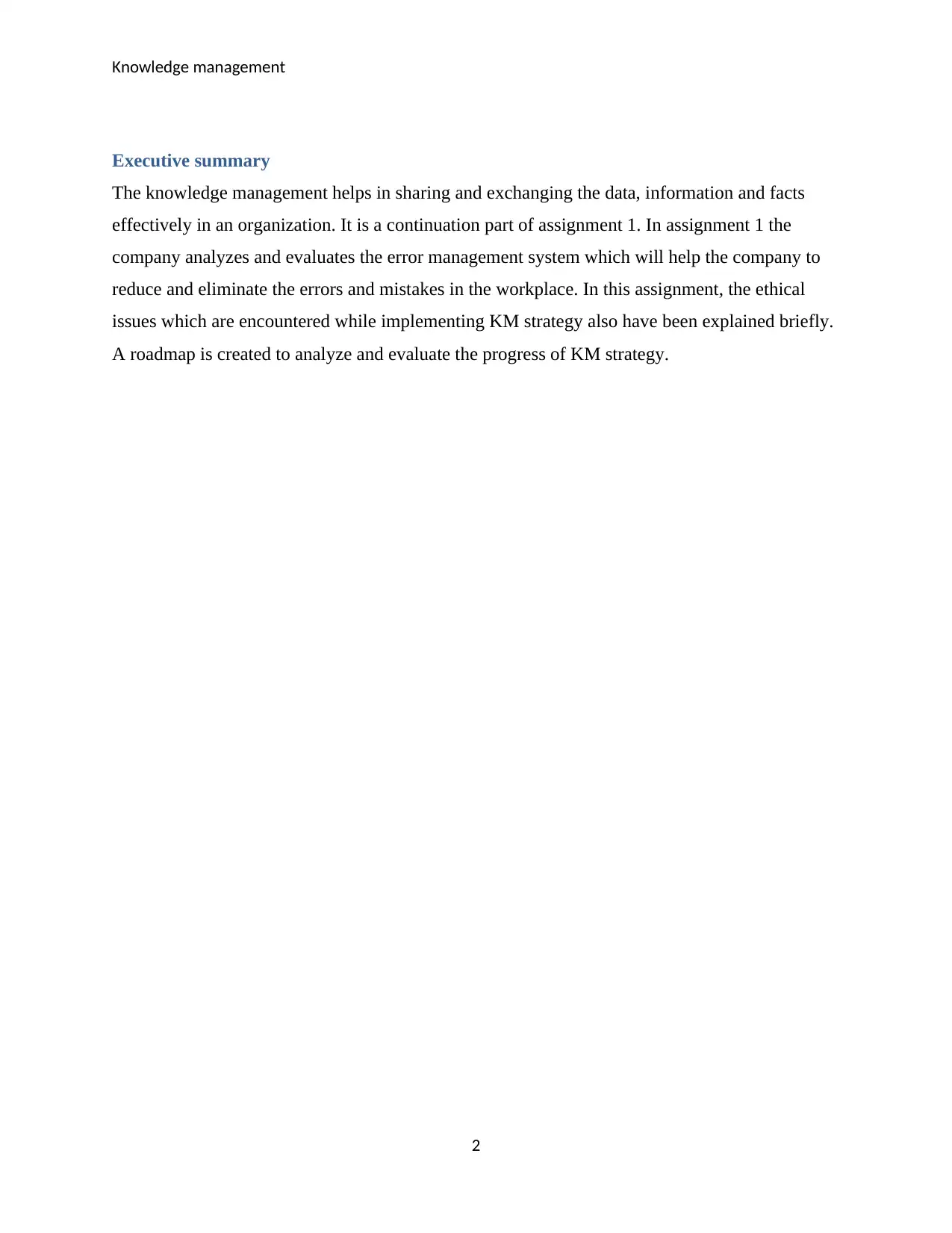
Knowledge management
Executive summary
The knowledge management helps in sharing and exchanging the data, information and facts
effectively in an organization. It is a continuation part of assignment 1. In assignment 1 the
company analyzes and evaluates the error management system which will help the company to
reduce and eliminate the errors and mistakes in the workplace. In this assignment, the ethical
issues which are encountered while implementing KM strategy also have been explained briefly.
A roadmap is created to analyze and evaluate the progress of KM strategy.
2
Executive summary
The knowledge management helps in sharing and exchanging the data, information and facts
effectively in an organization. It is a continuation part of assignment 1. In assignment 1 the
company analyzes and evaluates the error management system which will help the company to
reduce and eliminate the errors and mistakes in the workplace. In this assignment, the ethical
issues which are encountered while implementing KM strategy also have been explained briefly.
A roadmap is created to analyze and evaluate the progress of KM strategy.
2
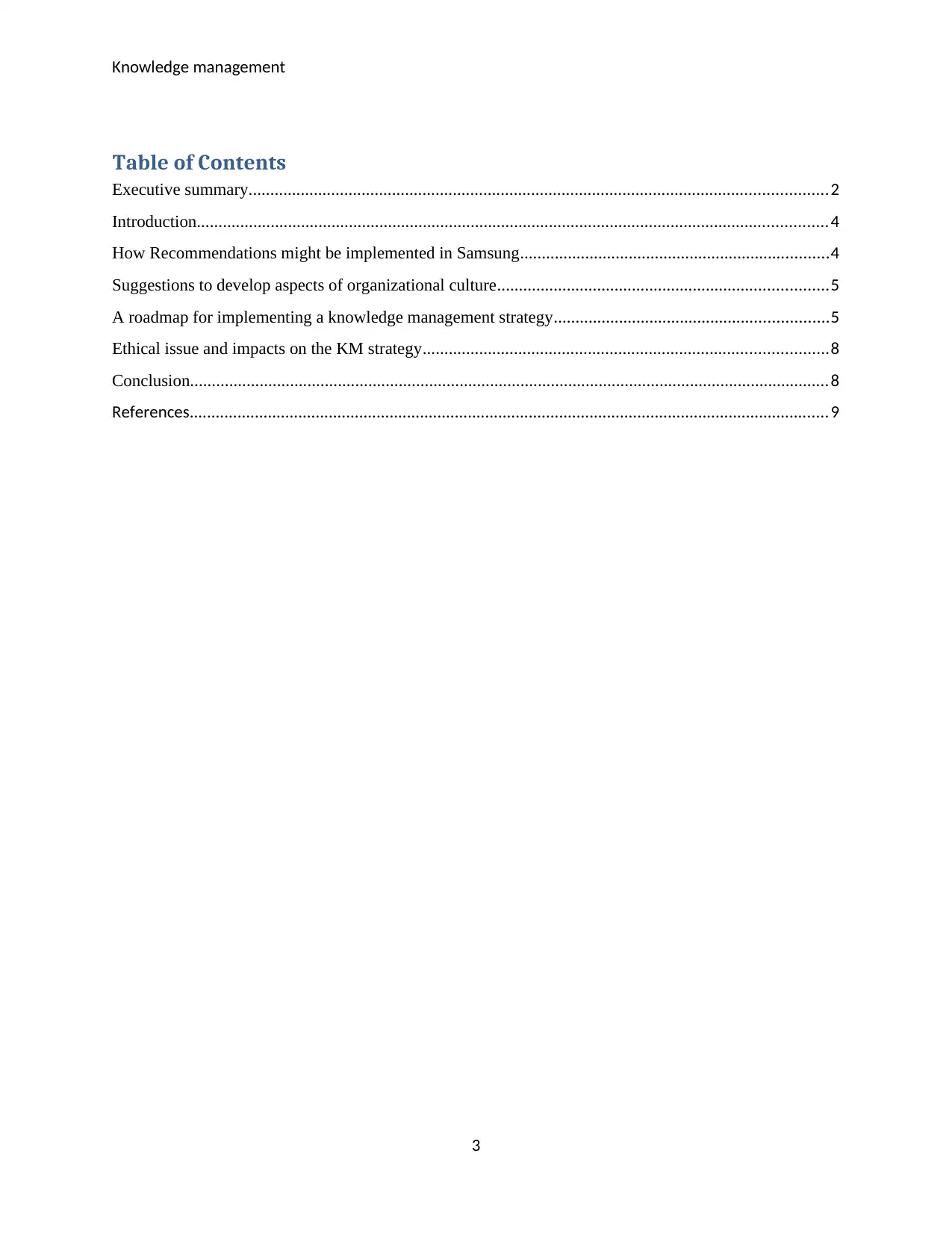
Knowledge management
Table of Contents
Executive summary.....................................................................................................................................2
Introduction.................................................................................................................................................4
How Recommendations might be implemented in Samsung.......................................................................4
Suggestions to develop aspects of organizational culture............................................................................5
A roadmap for implementing a knowledge management strategy...............................................................5
Ethical issue and impacts on the KM strategy.............................................................................................8
Conclusion...................................................................................................................................................8
References...................................................................................................................................................9
3
Table of Contents
Executive summary.....................................................................................................................................2
Introduction.................................................................................................................................................4
How Recommendations might be implemented in Samsung.......................................................................4
Suggestions to develop aspects of organizational culture............................................................................5
A roadmap for implementing a knowledge management strategy...............................................................5
Ethical issue and impacts on the KM strategy.............................................................................................8
Conclusion...................................................................................................................................................8
References...................................................................................................................................................9
3
⊘ This is a preview!⊘
Do you want full access?
Subscribe today to unlock all pages.

Trusted by 1+ million students worldwide
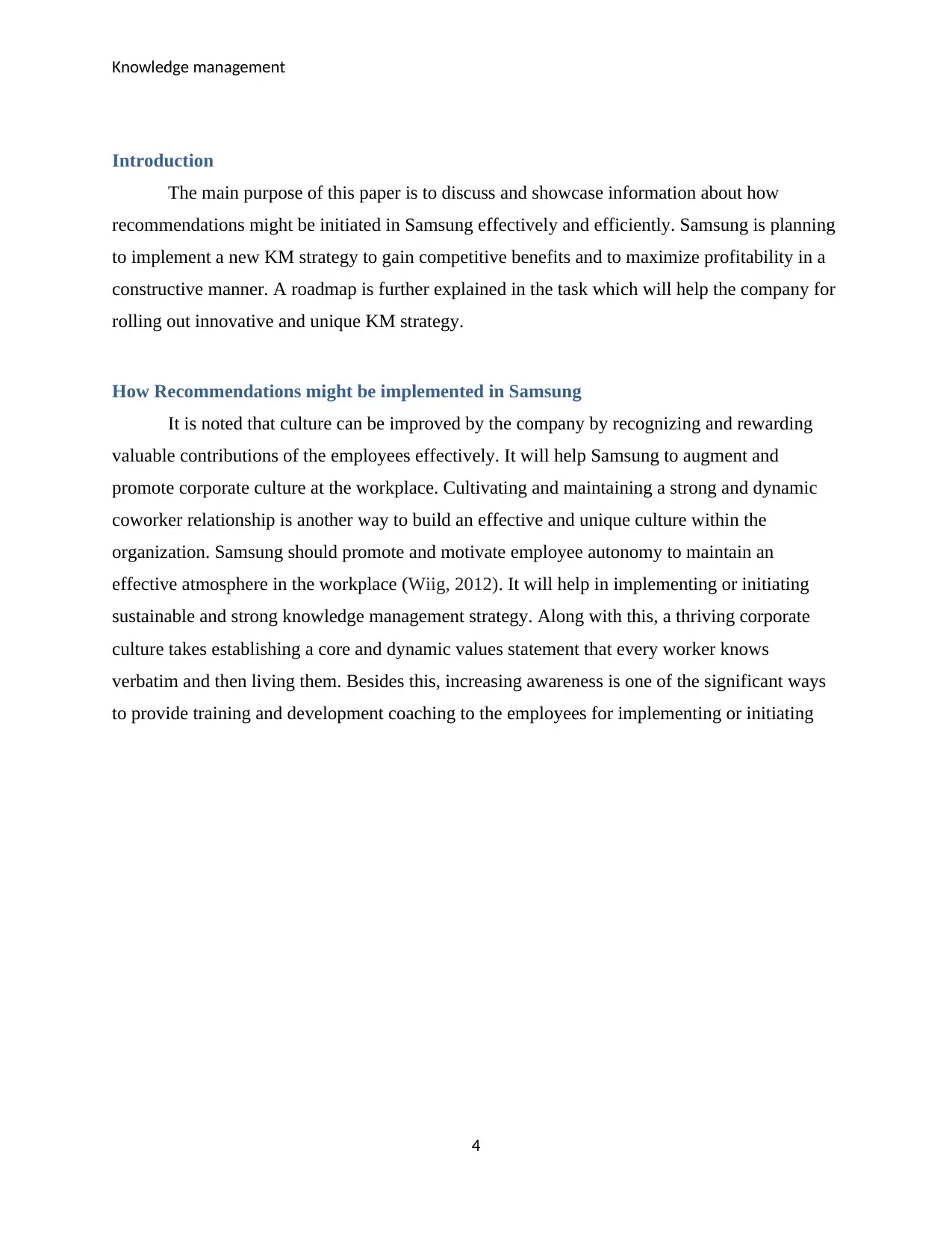
Knowledge management
Introduction
The main purpose of this paper is to discuss and showcase information about how
recommendations might be initiated in Samsung effectively and efficiently. Samsung is planning
to implement a new KM strategy to gain competitive benefits and to maximize profitability in a
constructive manner. A roadmap is further explained in the task which will help the company for
rolling out innovative and unique KM strategy.
How Recommendations might be implemented in Samsung
It is noted that culture can be improved by the company by recognizing and rewarding
valuable contributions of the employees effectively. It will help Samsung to augment and
promote corporate culture at the workplace. Cultivating and maintaining a strong and dynamic
coworker relationship is another way to build an effective and unique culture within the
organization. Samsung should promote and motivate employee autonomy to maintain an
effective atmosphere in the workplace (Wiig, 2012). It will help in implementing or initiating
sustainable and strong knowledge management strategy. Along with this, a thriving corporate
culture takes establishing a core and dynamic values statement that every worker knows
verbatim and then living them. Besides this, increasing awareness is one of the significant ways
to provide training and development coaching to the employees for implementing or initiating
4
Introduction
The main purpose of this paper is to discuss and showcase information about how
recommendations might be initiated in Samsung effectively and efficiently. Samsung is planning
to implement a new KM strategy to gain competitive benefits and to maximize profitability in a
constructive manner. A roadmap is further explained in the task which will help the company for
rolling out innovative and unique KM strategy.
How Recommendations might be implemented in Samsung
It is noted that culture can be improved by the company by recognizing and rewarding
valuable contributions of the employees effectively. It will help Samsung to augment and
promote corporate culture at the workplace. Cultivating and maintaining a strong and dynamic
coworker relationship is another way to build an effective and unique culture within the
organization. Samsung should promote and motivate employee autonomy to maintain an
effective atmosphere in the workplace (Wiig, 2012). It will help in implementing or initiating
sustainable and strong knowledge management strategy. Along with this, a thriving corporate
culture takes establishing a core and dynamic values statement that every worker knows
verbatim and then living them. Besides this, increasing awareness is one of the significant ways
to provide training and development coaching to the employees for implementing or initiating
4
Paraphrase This Document
Need a fresh take? Get an instant paraphrase of this document with our AI Paraphraser
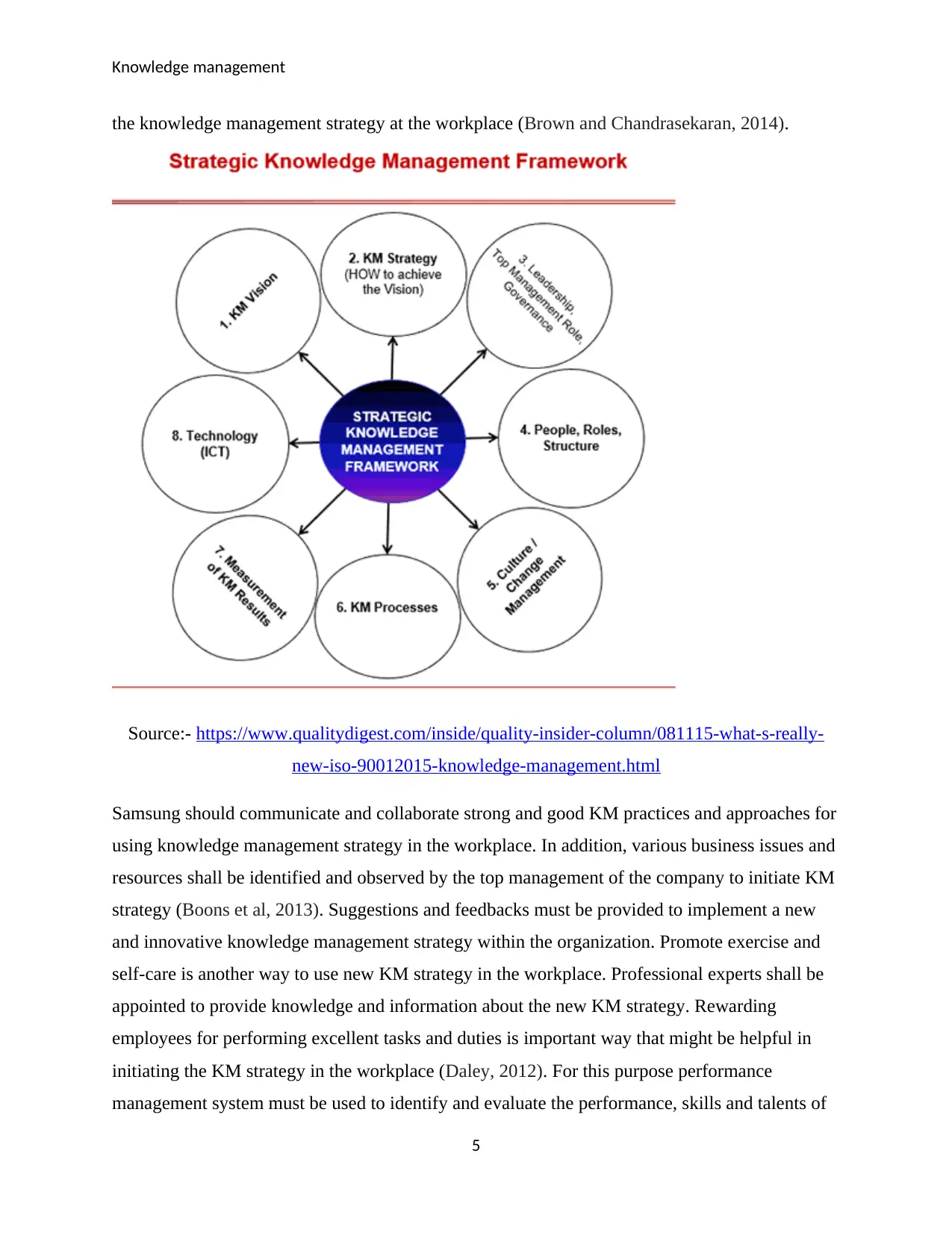
Knowledge management
the knowledge management strategy at the workplace (Brown and Chandrasekaran, 2014).
Source:- https://www.qualitydigest.com/inside/quality-insider-column/081115-what-s-really-
new-iso-90012015-knowledge-management.html
Samsung should communicate and collaborate strong and good KM practices and approaches for
using knowledge management strategy in the workplace. In addition, various business issues and
resources shall be identified and observed by the top management of the company to initiate KM
strategy (Boons et al, 2013). Suggestions and feedbacks must be provided to implement a new
and innovative knowledge management strategy within the organization. Promote exercise and
self-care is another way to use new KM strategy in the workplace. Professional experts shall be
appointed to provide knowledge and information about the new KM strategy. Rewarding
employees for performing excellent tasks and duties is important way that might be helpful in
initiating the KM strategy in the workplace (Daley, 2012). For this purpose performance
management system must be used to identify and evaluate the performance, skills and talents of
5
the knowledge management strategy at the workplace (Brown and Chandrasekaran, 2014).
Source:- https://www.qualitydigest.com/inside/quality-insider-column/081115-what-s-really-
new-iso-90012015-knowledge-management.html
Samsung should communicate and collaborate strong and good KM practices and approaches for
using knowledge management strategy in the workplace. In addition, various business issues and
resources shall be identified and observed by the top management of the company to initiate KM
strategy (Boons et al, 2013). Suggestions and feedbacks must be provided to implement a new
and innovative knowledge management strategy within the organization. Promote exercise and
self-care is another way to use new KM strategy in the workplace. Professional experts shall be
appointed to provide knowledge and information about the new KM strategy. Rewarding
employees for performing excellent tasks and duties is important way that might be helpful in
initiating the KM strategy in the workplace (Daley, 2012). For this purpose performance
management system must be used to identify and evaluate the performance, skills and talents of
5
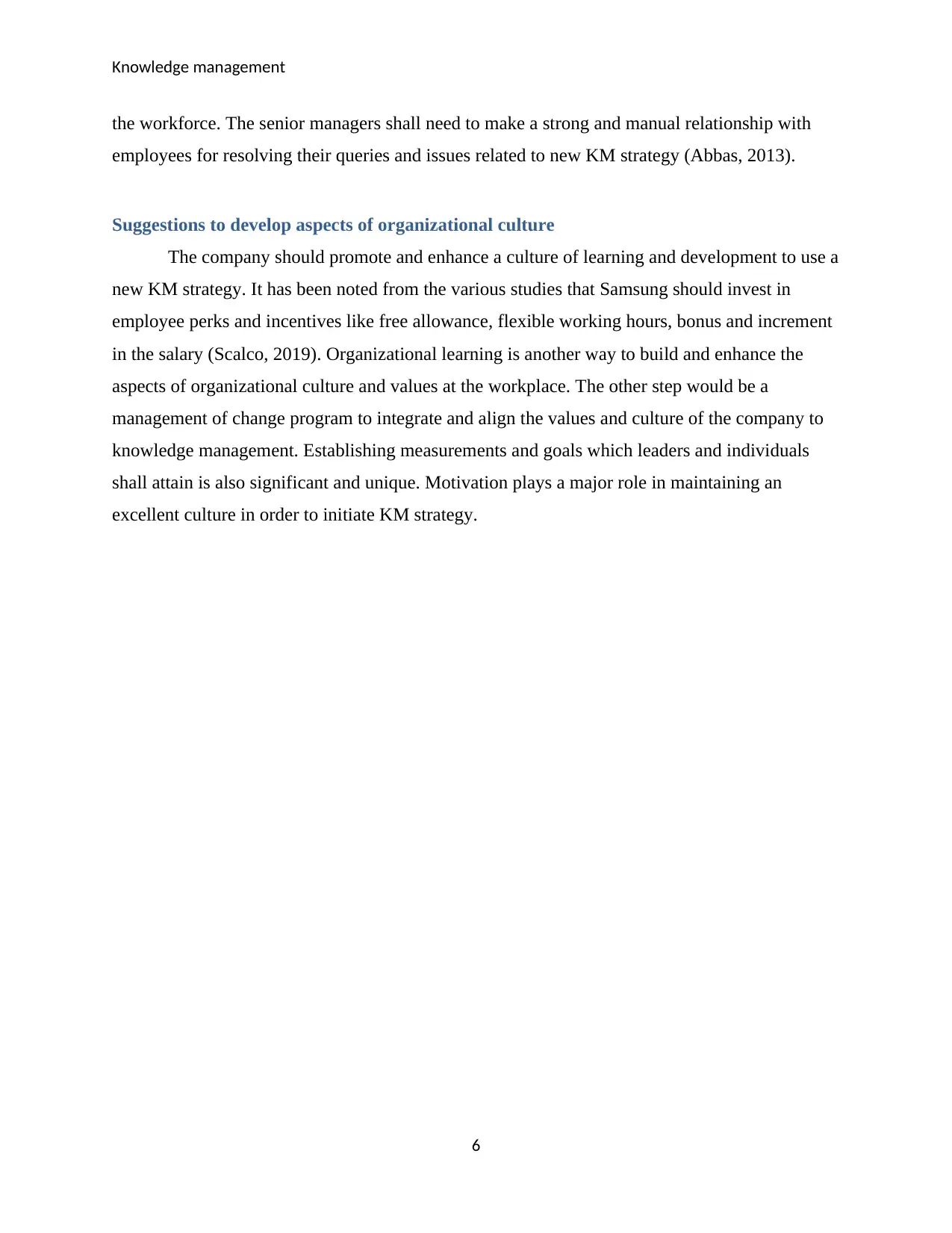
Knowledge management
the workforce. The senior managers shall need to make a strong and manual relationship with
employees for resolving their queries and issues related to new KM strategy (Abbas, 2013).
Suggestions to develop aspects of organizational culture
The company should promote and enhance a culture of learning and development to use a
new KM strategy. It has been noted from the various studies that Samsung should invest in
employee perks and incentives like free allowance, flexible working hours, bonus and increment
in the salary (Scalco, 2019). Organizational learning is another way to build and enhance the
aspects of organizational culture and values at the workplace. The other step would be a
management of change program to integrate and align the values and culture of the company to
knowledge management. Establishing measurements and goals which leaders and individuals
shall attain is also significant and unique. Motivation plays a major role in maintaining an
excellent culture in order to initiate KM strategy.
6
the workforce. The senior managers shall need to make a strong and manual relationship with
employees for resolving their queries and issues related to new KM strategy (Abbas, 2013).
Suggestions to develop aspects of organizational culture
The company should promote and enhance a culture of learning and development to use a
new KM strategy. It has been noted from the various studies that Samsung should invest in
employee perks and incentives like free allowance, flexible working hours, bonus and increment
in the salary (Scalco, 2019). Organizational learning is another way to build and enhance the
aspects of organizational culture and values at the workplace. The other step would be a
management of change program to integrate and align the values and culture of the company to
knowledge management. Establishing measurements and goals which leaders and individuals
shall attain is also significant and unique. Motivation plays a major role in maintaining an
excellent culture in order to initiate KM strategy.
6
⊘ This is a preview!⊘
Do you want full access?
Subscribe today to unlock all pages.

Trusted by 1+ million students worldwide
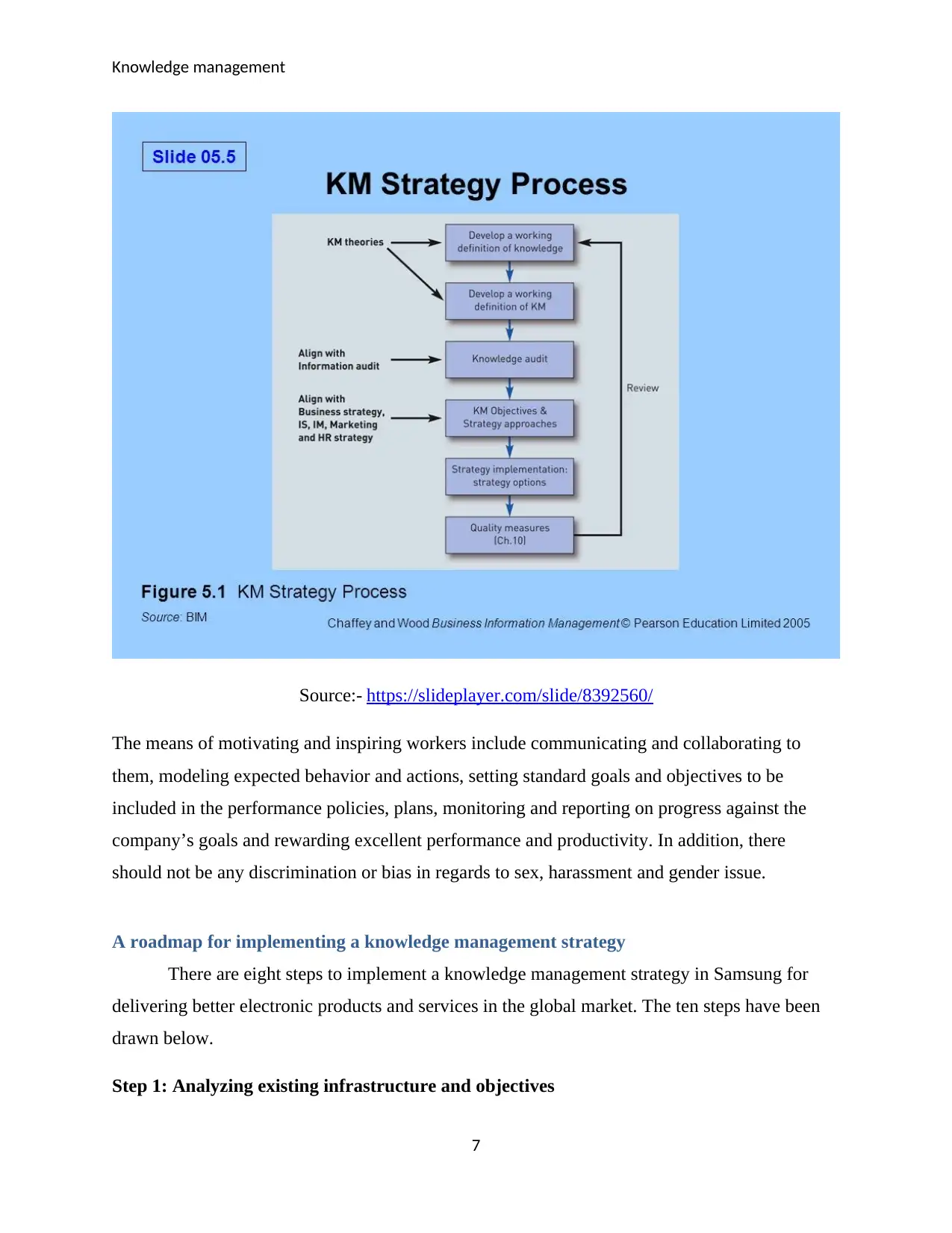
Knowledge management
Source:- https://slideplayer.com/slide/8392560/
The means of motivating and inspiring workers include communicating and collaborating to
them, modeling expected behavior and actions, setting standard goals and objectives to be
included in the performance policies, plans, monitoring and reporting on progress against the
company’s goals and rewarding excellent performance and productivity. In addition, there
should not be any discrimination or bias in regards to sex, harassment and gender issue.
A roadmap for implementing a knowledge management strategy
There are eight steps to implement a knowledge management strategy in Samsung for
delivering better electronic products and services in the global market. The ten steps have been
drawn below.
Step 1: Analyzing existing infrastructure and objectives
7
Source:- https://slideplayer.com/slide/8392560/
The means of motivating and inspiring workers include communicating and collaborating to
them, modeling expected behavior and actions, setting standard goals and objectives to be
included in the performance policies, plans, monitoring and reporting on progress against the
company’s goals and rewarding excellent performance and productivity. In addition, there
should not be any discrimination or bias in regards to sex, harassment and gender issue.
A roadmap for implementing a knowledge management strategy
There are eight steps to implement a knowledge management strategy in Samsung for
delivering better electronic products and services in the global market. The ten steps have been
drawn below.
Step 1: Analyzing existing infrastructure and objectives
7
Paraphrase This Document
Need a fresh take? Get an instant paraphrase of this document with our AI Paraphraser
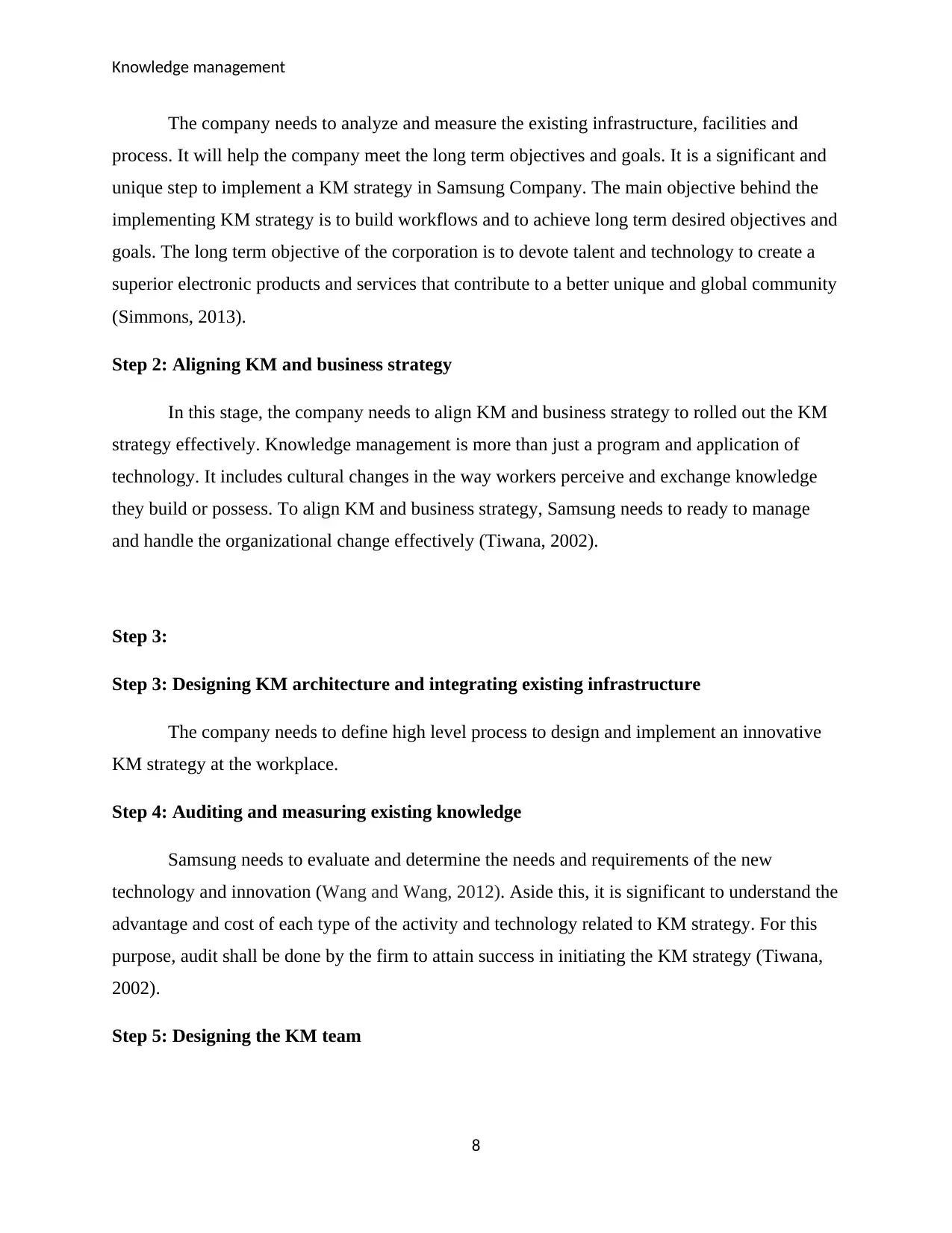
Knowledge management
The company needs to analyze and measure the existing infrastructure, facilities and
process. It will help the company meet the long term objectives and goals. It is a significant and
unique step to implement a KM strategy in Samsung Company. The main objective behind the
implementing KM strategy is to build workflows and to achieve long term desired objectives and
goals. The long term objective of the corporation is to devote talent and technology to create a
superior electronic products and services that contribute to a better unique and global community
(Simmons, 2013).
Step 2: Aligning KM and business strategy
In this stage, the company needs to align KM and business strategy to rolled out the KM
strategy effectively. Knowledge management is more than just a program and application of
technology. It includes cultural changes in the way workers perceive and exchange knowledge
they build or possess. To align KM and business strategy, Samsung needs to ready to manage
and handle the organizational change effectively (Tiwana, 2002).
Step 3:
Step 3: Designing KM architecture and integrating existing infrastructure
The company needs to define high level process to design and implement an innovative
KM strategy at the workplace.
Step 4: Auditing and measuring existing knowledge
Samsung needs to evaluate and determine the needs and requirements of the new
technology and innovation (Wang and Wang, 2012). Aside this, it is significant to understand the
advantage and cost of each type of the activity and technology related to KM strategy. For this
purpose, audit shall be done by the firm to attain success in initiating the KM strategy (Tiwana,
2002).
Step 5: Designing the KM team
8
The company needs to analyze and measure the existing infrastructure, facilities and
process. It will help the company meet the long term objectives and goals. It is a significant and
unique step to implement a KM strategy in Samsung Company. The main objective behind the
implementing KM strategy is to build workflows and to achieve long term desired objectives and
goals. The long term objective of the corporation is to devote talent and technology to create a
superior electronic products and services that contribute to a better unique and global community
(Simmons, 2013).
Step 2: Aligning KM and business strategy
In this stage, the company needs to align KM and business strategy to rolled out the KM
strategy effectively. Knowledge management is more than just a program and application of
technology. It includes cultural changes in the way workers perceive and exchange knowledge
they build or possess. To align KM and business strategy, Samsung needs to ready to manage
and handle the organizational change effectively (Tiwana, 2002).
Step 3:
Step 3: Designing KM architecture and integrating existing infrastructure
The company needs to define high level process to design and implement an innovative
KM strategy at the workplace.
Step 4: Auditing and measuring existing knowledge
Samsung needs to evaluate and determine the needs and requirements of the new
technology and innovation (Wang and Wang, 2012). Aside this, it is significant to understand the
advantage and cost of each type of the activity and technology related to KM strategy. For this
purpose, audit shall be done by the firm to attain success in initiating the KM strategy (Tiwana,
2002).
Step 5: Designing the KM team
8
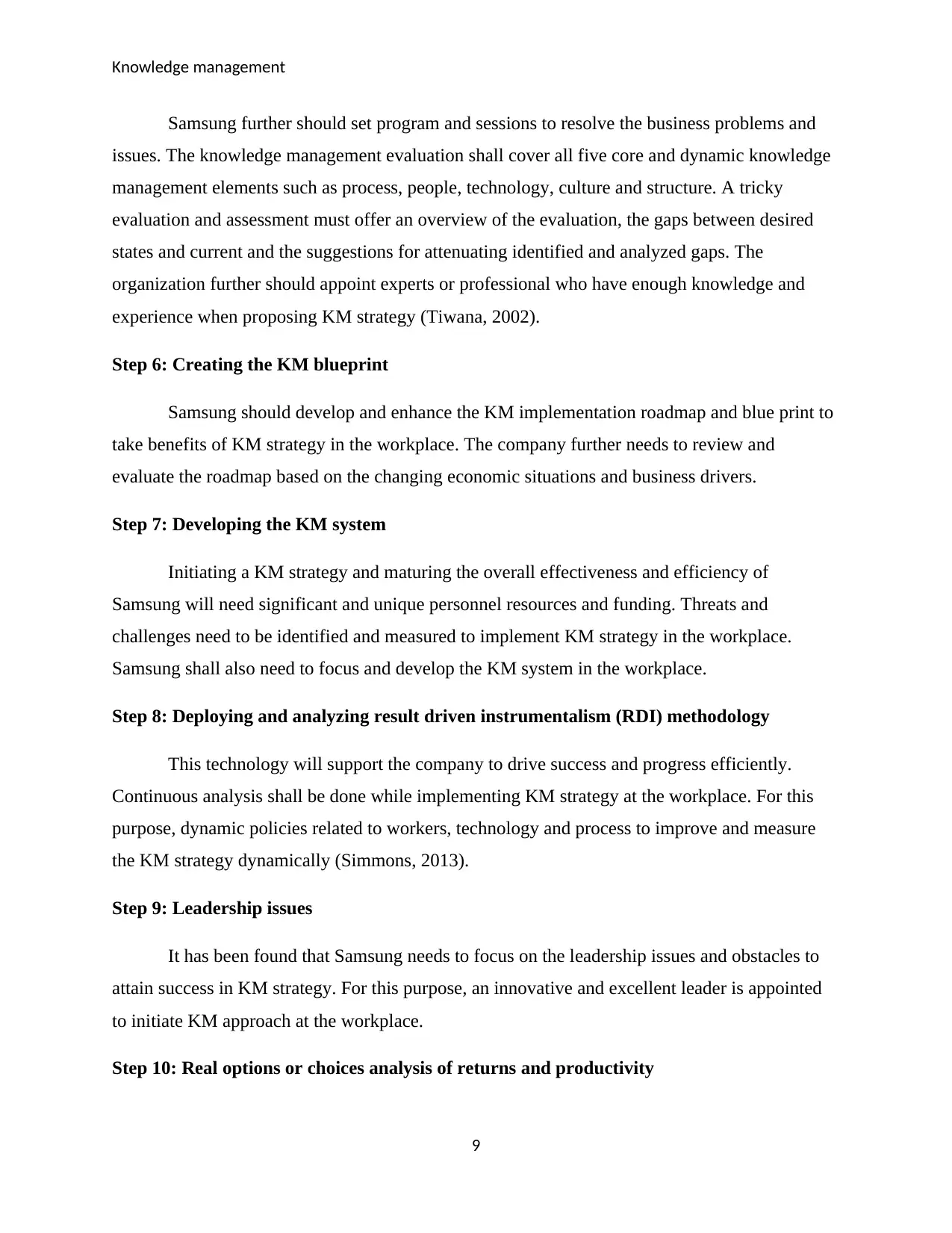
Knowledge management
Samsung further should set program and sessions to resolve the business problems and
issues. The knowledge management evaluation shall cover all five core and dynamic knowledge
management elements such as process, people, technology, culture and structure. A tricky
evaluation and assessment must offer an overview of the evaluation, the gaps between desired
states and current and the suggestions for attenuating identified and analyzed gaps. The
organization further should appoint experts or professional who have enough knowledge and
experience when proposing KM strategy (Tiwana, 2002).
Step 6: Creating the KM blueprint
Samsung should develop and enhance the KM implementation roadmap and blue print to
take benefits of KM strategy in the workplace. The company further needs to review and
evaluate the roadmap based on the changing economic situations and business drivers.
Step 7: Developing the KM system
Initiating a KM strategy and maturing the overall effectiveness and efficiency of
Samsung will need significant and unique personnel resources and funding. Threats and
challenges need to be identified and measured to implement KM strategy in the workplace.
Samsung shall also need to focus and develop the KM system in the workplace.
Step 8: Deploying and analyzing result driven instrumentalism (RDI) methodology
This technology will support the company to drive success and progress efficiently.
Continuous analysis shall be done while implementing KM strategy at the workplace. For this
purpose, dynamic policies related to workers, technology and process to improve and measure
the KM strategy dynamically (Simmons, 2013).
Step 9: Leadership issues
It has been found that Samsung needs to focus on the leadership issues and obstacles to
attain success in KM strategy. For this purpose, an innovative and excellent leader is appointed
to initiate KM approach at the workplace.
Step 10: Real options or choices analysis of returns and productivity
9
Samsung further should set program and sessions to resolve the business problems and
issues. The knowledge management evaluation shall cover all five core and dynamic knowledge
management elements such as process, people, technology, culture and structure. A tricky
evaluation and assessment must offer an overview of the evaluation, the gaps between desired
states and current and the suggestions for attenuating identified and analyzed gaps. The
organization further should appoint experts or professional who have enough knowledge and
experience when proposing KM strategy (Tiwana, 2002).
Step 6: Creating the KM blueprint
Samsung should develop and enhance the KM implementation roadmap and blue print to
take benefits of KM strategy in the workplace. The company further needs to review and
evaluate the roadmap based on the changing economic situations and business drivers.
Step 7: Developing the KM system
Initiating a KM strategy and maturing the overall effectiveness and efficiency of
Samsung will need significant and unique personnel resources and funding. Threats and
challenges need to be identified and measured to implement KM strategy in the workplace.
Samsung shall also need to focus and develop the KM system in the workplace.
Step 8: Deploying and analyzing result driven instrumentalism (RDI) methodology
This technology will support the company to drive success and progress efficiently.
Continuous analysis shall be done while implementing KM strategy at the workplace. For this
purpose, dynamic policies related to workers, technology and process to improve and measure
the KM strategy dynamically (Simmons, 2013).
Step 9: Leadership issues
It has been found that Samsung needs to focus on the leadership issues and obstacles to
attain success in KM strategy. For this purpose, an innovative and excellent leader is appointed
to initiate KM approach at the workplace.
Step 10: Real options or choices analysis of returns and productivity
9
⊘ This is a preview!⊘
Do you want full access?
Subscribe today to unlock all pages.

Trusted by 1+ million students worldwide
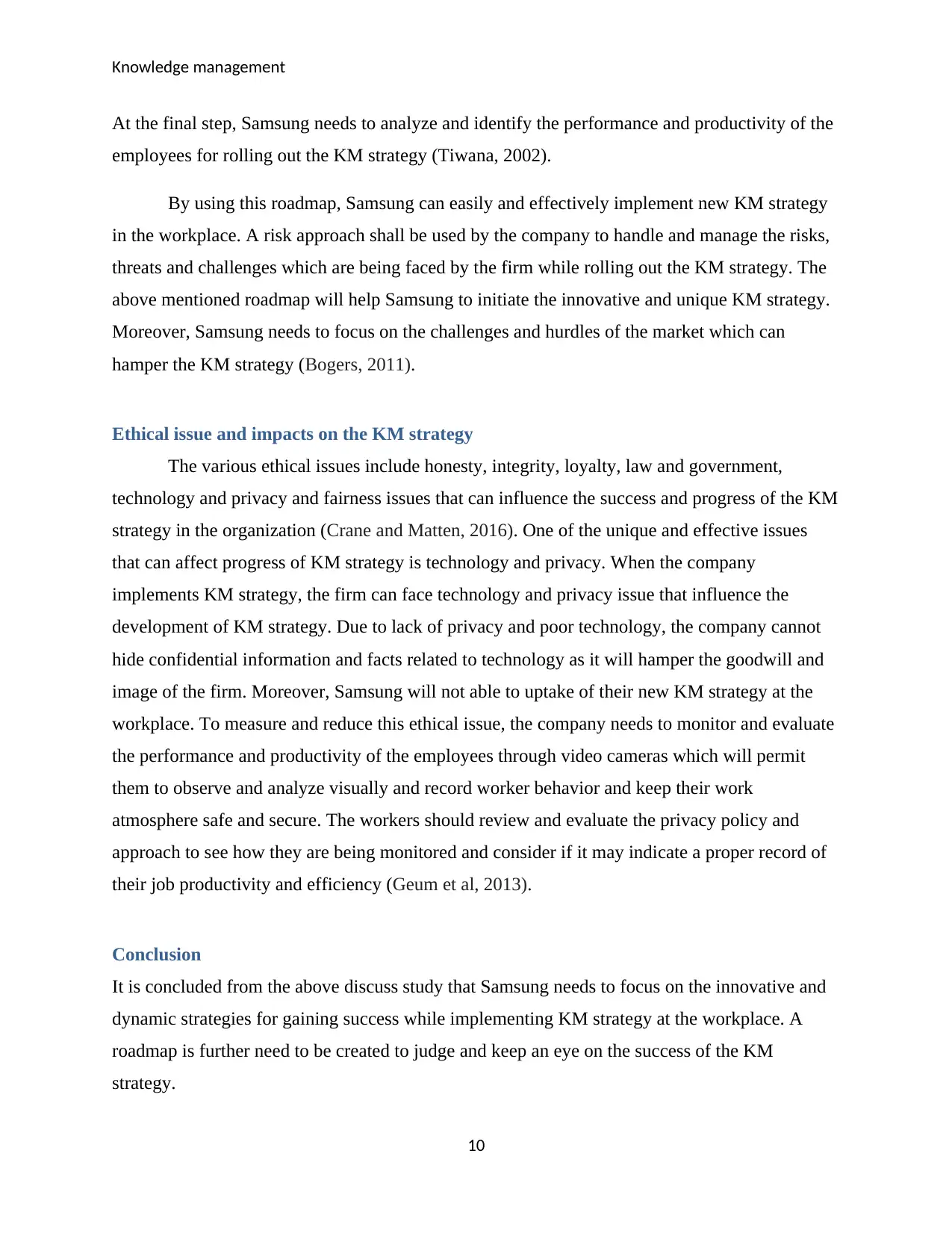
Knowledge management
At the final step, Samsung needs to analyze and identify the performance and productivity of the
employees for rolling out the KM strategy (Tiwana, 2002).
By using this roadmap, Samsung can easily and effectively implement new KM strategy
in the workplace. A risk approach shall be used by the company to handle and manage the risks,
threats and challenges which are being faced by the firm while rolling out the KM strategy. The
above mentioned roadmap will help Samsung to initiate the innovative and unique KM strategy.
Moreover, Samsung needs to focus on the challenges and hurdles of the market which can
hamper the KM strategy (Bogers, 2011).
Ethical issue and impacts on the KM strategy
The various ethical issues include honesty, integrity, loyalty, law and government,
technology and privacy and fairness issues that can influence the success and progress of the KM
strategy in the organization (Crane and Matten, 2016). One of the unique and effective issues
that can affect progress of KM strategy is technology and privacy. When the company
implements KM strategy, the firm can face technology and privacy issue that influence the
development of KM strategy. Due to lack of privacy and poor technology, the company cannot
hide confidential information and facts related to technology as it will hamper the goodwill and
image of the firm. Moreover, Samsung will not able to uptake of their new KM strategy at the
workplace. To measure and reduce this ethical issue, the company needs to monitor and evaluate
the performance and productivity of the employees through video cameras which will permit
them to observe and analyze visually and record worker behavior and keep their work
atmosphere safe and secure. The workers should review and evaluate the privacy policy and
approach to see how they are being monitored and consider if it may indicate a proper record of
their job productivity and efficiency (Geum et al, 2013).
Conclusion
It is concluded from the above discuss study that Samsung needs to focus on the innovative and
dynamic strategies for gaining success while implementing KM strategy at the workplace. A
roadmap is further need to be created to judge and keep an eye on the success of the KM
strategy.
10
At the final step, Samsung needs to analyze and identify the performance and productivity of the
employees for rolling out the KM strategy (Tiwana, 2002).
By using this roadmap, Samsung can easily and effectively implement new KM strategy
in the workplace. A risk approach shall be used by the company to handle and manage the risks,
threats and challenges which are being faced by the firm while rolling out the KM strategy. The
above mentioned roadmap will help Samsung to initiate the innovative and unique KM strategy.
Moreover, Samsung needs to focus on the challenges and hurdles of the market which can
hamper the KM strategy (Bogers, 2011).
Ethical issue and impacts on the KM strategy
The various ethical issues include honesty, integrity, loyalty, law and government,
technology and privacy and fairness issues that can influence the success and progress of the KM
strategy in the organization (Crane and Matten, 2016). One of the unique and effective issues
that can affect progress of KM strategy is technology and privacy. When the company
implements KM strategy, the firm can face technology and privacy issue that influence the
development of KM strategy. Due to lack of privacy and poor technology, the company cannot
hide confidential information and facts related to technology as it will hamper the goodwill and
image of the firm. Moreover, Samsung will not able to uptake of their new KM strategy at the
workplace. To measure and reduce this ethical issue, the company needs to monitor and evaluate
the performance and productivity of the employees through video cameras which will permit
them to observe and analyze visually and record worker behavior and keep their work
atmosphere safe and secure. The workers should review and evaluate the privacy policy and
approach to see how they are being monitored and consider if it may indicate a proper record of
their job productivity and efficiency (Geum et al, 2013).
Conclusion
It is concluded from the above discuss study that Samsung needs to focus on the innovative and
dynamic strategies for gaining success while implementing KM strategy at the workplace. A
roadmap is further need to be created to judge and keep an eye on the success of the KM
strategy.
10
Paraphrase This Document
Need a fresh take? Get an instant paraphrase of this document with our AI Paraphraser

Knowledge management
11
11
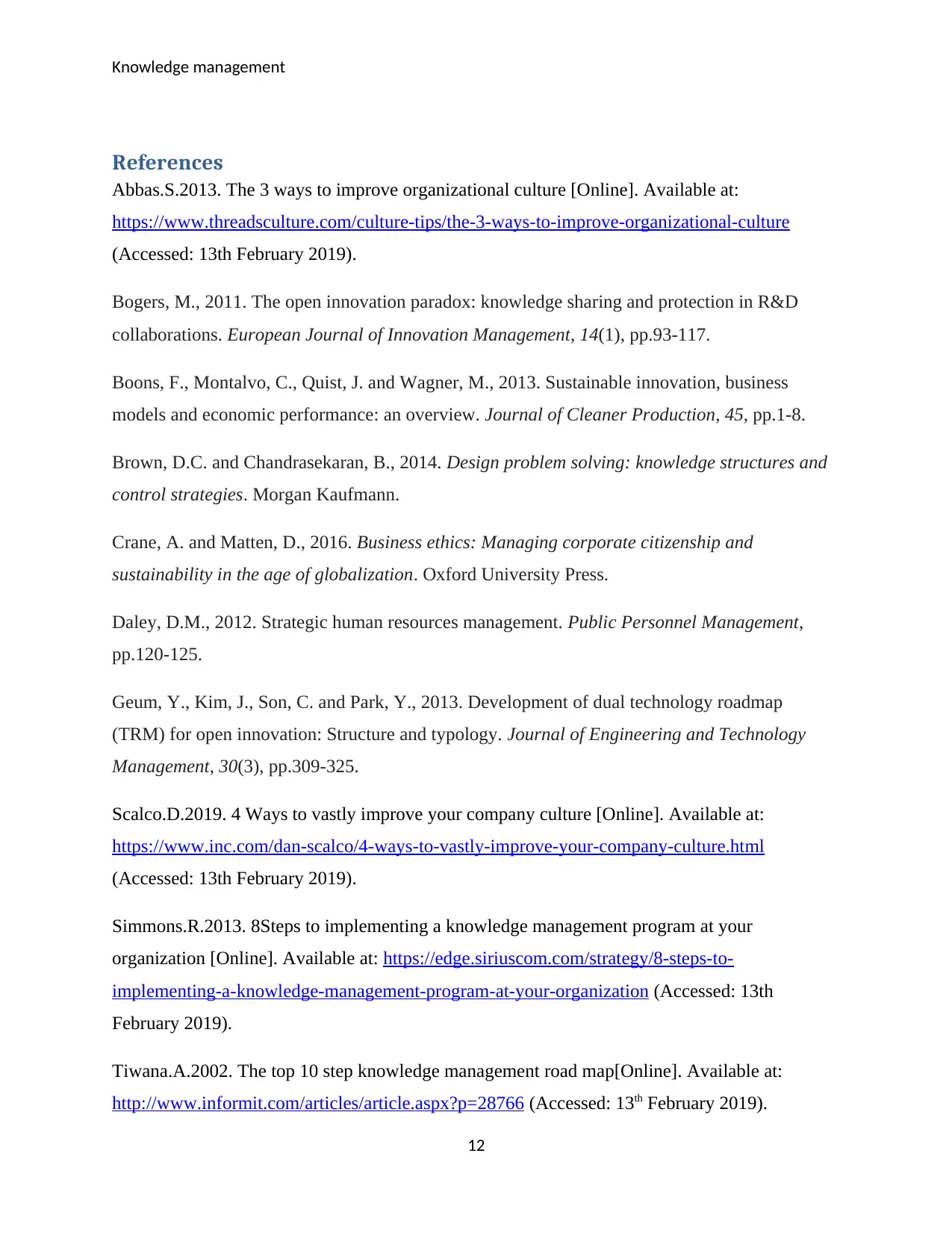
Knowledge management
References
Abbas.S.2013. The 3 ways to improve organizational culture [Online]. Available at:
https://www.threadsculture.com/culture-tips/the-3-ways-to-improve-organizational-culture
(Accessed: 13th February 2019).
Bogers, M., 2011. The open innovation paradox: knowledge sharing and protection in R&D
collaborations. European Journal of Innovation Management, 14(1), pp.93-117.
Boons, F., Montalvo, C., Quist, J. and Wagner, M., 2013. Sustainable innovation, business
models and economic performance: an overview. Journal of Cleaner Production, 45, pp.1-8.
Brown, D.C. and Chandrasekaran, B., 2014. Design problem solving: knowledge structures and
control strategies. Morgan Kaufmann.
Crane, A. and Matten, D., 2016. Business ethics: Managing corporate citizenship and
sustainability in the age of globalization. Oxford University Press.
Daley, D.M., 2012. Strategic human resources management. Public Personnel Management,
pp.120-125.
Geum, Y., Kim, J., Son, C. and Park, Y., 2013. Development of dual technology roadmap
(TRM) for open innovation: Structure and typology. Journal of Engineering and Technology
Management, 30(3), pp.309-325.
Scalco.D.2019. 4 Ways to vastly improve your company culture [Online]. Available at:
https://www.inc.com/dan-scalco/4-ways-to-vastly-improve-your-company-culture.html
(Accessed: 13th February 2019).
Simmons.R.2013. 8Steps to implementing a knowledge management program at your
organization [Online]. Available at: https://edge.siriuscom.com/strategy/8-steps-to-
implementing-a-knowledge-management-program-at-your-organization (Accessed: 13th
February 2019).
Tiwana.A.2002. The top 10 step knowledge management road map[Online]. Available at:
http://www.informit.com/articles/article.aspx?p=28766 (Accessed: 13th February 2019).
12
References
Abbas.S.2013. The 3 ways to improve organizational culture [Online]. Available at:
https://www.threadsculture.com/culture-tips/the-3-ways-to-improve-organizational-culture
(Accessed: 13th February 2019).
Bogers, M., 2011. The open innovation paradox: knowledge sharing and protection in R&D
collaborations. European Journal of Innovation Management, 14(1), pp.93-117.
Boons, F., Montalvo, C., Quist, J. and Wagner, M., 2013. Sustainable innovation, business
models and economic performance: an overview. Journal of Cleaner Production, 45, pp.1-8.
Brown, D.C. and Chandrasekaran, B., 2014. Design problem solving: knowledge structures and
control strategies. Morgan Kaufmann.
Crane, A. and Matten, D., 2016. Business ethics: Managing corporate citizenship and
sustainability in the age of globalization. Oxford University Press.
Daley, D.M., 2012. Strategic human resources management. Public Personnel Management,
pp.120-125.
Geum, Y., Kim, J., Son, C. and Park, Y., 2013. Development of dual technology roadmap
(TRM) for open innovation: Structure and typology. Journal of Engineering and Technology
Management, 30(3), pp.309-325.
Scalco.D.2019. 4 Ways to vastly improve your company culture [Online]. Available at:
https://www.inc.com/dan-scalco/4-ways-to-vastly-improve-your-company-culture.html
(Accessed: 13th February 2019).
Simmons.R.2013. 8Steps to implementing a knowledge management program at your
organization [Online]. Available at: https://edge.siriuscom.com/strategy/8-steps-to-
implementing-a-knowledge-management-program-at-your-organization (Accessed: 13th
February 2019).
Tiwana.A.2002. The top 10 step knowledge management road map[Online]. Available at:
http://www.informit.com/articles/article.aspx?p=28766 (Accessed: 13th February 2019).
12
⊘ This is a preview!⊘
Do you want full access?
Subscribe today to unlock all pages.

Trusted by 1+ million students worldwide
1 out of 13
Related Documents
Your All-in-One AI-Powered Toolkit for Academic Success.
+13062052269
info@desklib.com
Available 24*7 on WhatsApp / Email
![[object Object]](/_next/static/media/star-bottom.7253800d.svg)
Unlock your academic potential
Copyright © 2020–2026 A2Z Services. All Rights Reserved. Developed and managed by ZUCOL.





